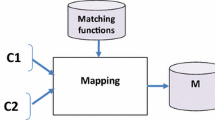Abstract
We use ontologies in this paper to search for alternative representations of geographic objects thus providing a description of these objects in cartographic vector maps. We define ontologies based on two types of concepts (“terminal” and “non-terminal”) and two kinds of relations (“has” and “is-a”). These are the basic elements used to describe a map. We also present a case study in which an ontology for topographic maps is created. Our approach is oriented towards solving heterogeneity and interoperability issues in GIS.
Preview
Unable to display preview. Download preview PDF.
Similar content being viewed by others
References
Berendt, B., Barkowsky, T., Freksa, C., Kelter, S.I.E.: Spatial Cognition - An Interdisciplinary Approach to Representing and Processing Spatial Knowledge. In: Spatial Representation with Aspect Maps, pp. 157–175. Springer, Heidelberg (1998)
Guarino, N.: Formal Ontology and Information Systems. In: Proceedings of the International Conference on Formal Ontology in Information Systems, pp. 3–15. Kluwer Academic Publishers, IOS Press, Trento (1998)
Fonseca, F., Davis, C., Câmara, G.: Bridging Ontologies and Conceptual Schemas in Geographic Information Integration. GeoInformatica 7(4), 355–378 (2003)
Gruber, T.R.: Toward Principles for the Design of Ontologies Used for Knowledge Sharing. International Journal of Human and Computer Studies 43(5/6), 907–928 (1995)
Mark, D., Egenhofer, M., Hirtle, S., Smith, B.: UCGIS Emerging Research Theme: Ontological Foundations for Geographic Information Science. In: UCGIS Emerging Research (2000)
Mark, D., Smith, B., Tversky, B.: Ontology and Geographic Objects: An Empirical Study of Cognitive Categorization. In: Proceedings of the Spatial Information Theory: A Theoretical Basis for GIS, Stade, Germany, pp. 283–298 (1999)
Mustière, S., Moulin, B.: What is Spatial Context in Cartographic Generalisation? In: Proceedings of the Symposiun on Geospatial Theory, Process and Applications, Ottawa, Canada (2002)
Smith, B., Mark, D.: Ontology and Geographic Kinds. In: Proceedings of the 8th International Sysmposium on Spatail Data Handling, Vancouver, Canada, pp. 308–320 (1998)
Torres, M., Levachkine, S.: Generating Spatial Ontologies based on Spatial Semantics. In: Proceedings of the International Workshop on Semantic Processing of Spatial Data, Mexico City, Mexico, pp. 163–178 (2003)
Worboys, M.F.: Metrics and Topologies for Geographic Space. In: Proceedings of the International Symposium on Spatial Data Handling, Delft, Netherlands, pp. 7A.1–7A.11 (1996)
Author information
Authors and Affiliations
Editor information
Editors and Affiliations
Rights and permissions
Copyright information
© 2005 Springer-Verlag Berlin Heidelberg
About this paper
Cite this paper
Torres, M., Quintero, R., Moreno, M., Fonseca, F. (2005). Ontology-Driven Description of Spatial Data for Their Semantic Processing. In: Rodríguez, M.A., Cruz, I., Levashkin, S., Egenhofer, M.J. (eds) GeoSpatial Semantics. GeoS 2005. Lecture Notes in Computer Science, vol 3799. Springer, Berlin, Heidelberg. https://doi.org/10.1007/11586180_18
Download citation
DOI: https://doi.org/10.1007/11586180_18
Publisher Name: Springer, Berlin, Heidelberg
Print ISBN: 978-3-540-30288-9
Online ISBN: 978-3-540-32283-2
eBook Packages: Computer ScienceComputer Science (R0)




